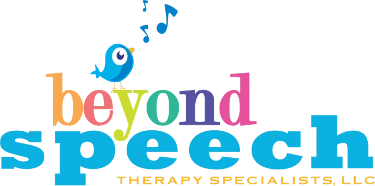May is National Speech-Language Month, so it’s the perfect time to highlight the crucial connection between speech-language skills and literacy development.
At Beyond Speech Therapy Specialists, we know that communication and reading abilities are deeply dependent on each other. This is why our approach to supporting speech and language development in children goes beyond traditional speech therapy with the use of the Wilson Reading Program.
For many kids, learning to read doesn’t come easily.
They may struggle to connect letters with sounds, blend sounds into words, or comprehend what they’re reading. These challenges can affect not just academic performance but also their budding self-confidence and overall attitude toward learning.
Our speech-language pathologists are uniquely positioned to help bridge these gaps using specialized, evidence-based approaches.
Let’s look at how our speech-language pathologists (SLPs) use the Wilson Reading Program to support your children’s literacy development as part of our therapy services.

What is the Wilson Reading Program?
The Wilson Reading Program is a structured literacy program designed to help struggling readers.
If you’re not familiar with it, think of it as a roadmap for teaching reading that leaves nothing to chance. Unlike traditional reading instruction that might move too quickly or assume certain skills are already mastered, Wilson breaks reading down into manageable steps that build upon each other.
The Wilson Reading Program focuses on:
• Sound-letter relationships:
Teaching children to connect letters with their corresponding sounds in a clear, consistent way
• Word structure:
Breaking words into syllables and understanding patterns in how words are built
• Step-by-step progression:
Moving from simple to complex in careful sequence, ensuring mastery before advancing
• Multisensory techniques:
Using sight, sound, movement, and touch to help children learn and remember reading concepts
What makes Wilson different from many other reading programs is its systematic, cumulative approach.
No skill is taught in isolation, and nothing is left to chance. This structured method is particularly effective for children who struggle with dyslexia or other reading difficulties, as it provides the explicit instruction they need to build reading confidence.
The Speech-Language Connection to Reading
Why do our speech-language pathologists work on reading instruction?
Because foundational reading skills support not just reading ability but overall speech development. These skills are deeply interconnected, and SLPs are trained experts in many of the building blocks essential for reading success.
One critical connection is phonemic awareness.Phonemic awareness is the ability to identify and manipulate individual sounds in spoken words.
You can think of it this way:
The word “cat” consists of three distinct sounds: /c/, /a/, and /t/. This awareness is fundamental for learning to read because it helps children connect speech sounds to letters – the basis of decoding words.
Children with speech difficulties often struggle with phonemic awareness, which can then lead to reading challenges.
For example:
• A child who has trouble pronouncing certain sounds may have difficulty identifying those same sounds in words
• A child with language delays might struggle with vocabulary and comprehension
• A child with auditory processing difficulties may find it hard to distinguish between similar sounds
SLPs are uniquely qualified to address these challenges because their training encompasses both oral language development and the foundations of literacy.
They understand the progression from speech sounds to spoken language to reading and writing, allowing them to identify exactly where breakdowns are occurring and how to address them.
Some signs your child might benefit from SLP support with reading include:
• Difficulty rhyming words
• Trouble blending sounds together
• Struggling to remember letter sounds
• Consistent reading errors
• Resistance to reading activities
• Falling behind peers despite traditional reading instruction
How We Use Wilson Reading In Our Practice
At Beyond Speech, we’re so proud to have SLPs who are specially trained in the Wilson Reading Program!
This specialized training allows us to offer comprehensive literacy support as part of our speech-language therapy services.
Our Wilson-trained SLPs work with school-age children from kindergarten through 6th grade who are experiencing reading difficulties. What makes this approach especially beneficial for families is that when provided by a qualified speech-language pathologist, these reading intervention services can often be billed as speech therapy through many insurance plans.
A typical Wilson Reading session may include:
• Assessment: First, we determine exactly where your child is struggling and which skills need support
• Individualized instruction: Sessions are tailored to your child’s specific needs, focusing on their unique challenges
• Systematic practice: Following the Wilson sequence, we guide your child through structured activities that build skills progressively
• Multisensory activities: We incorporate movement, tactile activities, visual cues, and auditory feedback to engage multiple learning pathways
What makes our approach different is the combination of speech-language expertise with literacy instruction. Our SLPs don’t just teach reading—they understand how your child’s specific speech or language challenges affect their reading development and can address both simultaneously.
Benefits of SLP-Delivered Reading Intervention
When reading instruction is provided by a speech-language pathologist trained in the Wilson Reading Program, children receive unique advantages that extend beyond traditional instruction or standard reading intervention.
Our highly trained SLPs bring specialized knowledge of phonemic awareness and sound production to the reading process.
This expertise allows them to:
• Identify subtle speech-sound errors that might be missed by other professionals
• Connect oral language skills with written language development
• Customize techniques based on how your child learns and processes information
• Address underlying language issues that may be affecting reading comprehension
For children who struggle with both speech and reading challenges, this integrated approach is so powerful!
Parents often notice improvements beyond just reading skills:
• Increased confidence in classroom participation
• Greater willingness to read aloud
• Improved spelling abilities
• Enhanced communication skills
The structured and sequential nature of the Wilson program, combined with the language expertise of our SLPs, creates an environment where children can build skills at their own pace without feeling overwhelmed or discouraged!
Reading Readiness and Next Steps:
Supporting Your Child’s Journey
What You Can Do at Home
Here are some simple activities you can incorporate into your daily routines to support your child’s language & literacy:
• Play with sounds:
Practice rhyming games, sound substitution (“What if we change the /m/ in ‘mat’ to /c/?”), or breaking words into individual sounds
• Read together daily:
Even just 15 minutes of shared reading builds crucial skills and positive associations
• Talk about letters and sounds:
Point out letter-sound connections in environmental print (signs, labels, menus)
• Celebrate progress:
Acknowledge and praise all effort, not just achievements. This process is work and any forward progress is amazing!
When to Seek Professional Help
While some reading difficulties are part of the normal learning process, others may require professional intervention.
Consider reaching out to us if your child:
• Shows persistent frustration with reading
• Avoids reading activities
• Has been receiving school support but continues to struggle
• Demonstrates a significant gap between their reading abilities and other skills
At Beyond Speech Therapy Specialists, we’re dedicated to helping every child build the communication and literacy skills they need to find their success!
Whether your child needs support with speech sounds, language development, or reading skills, our team of wonderful specialists is here to help with personalized therapies and specific programs like Wilson Reading.
If you have concerns about your child’s speech, language, or reading development, please reach out!
Click here to connect with us at Beyond Speech Therapy Specialists.
Our Wilson-trained SLPs can assess your child’s needs and develop a personalized plan to support their journey toward becoming a confident reader and communicator.

